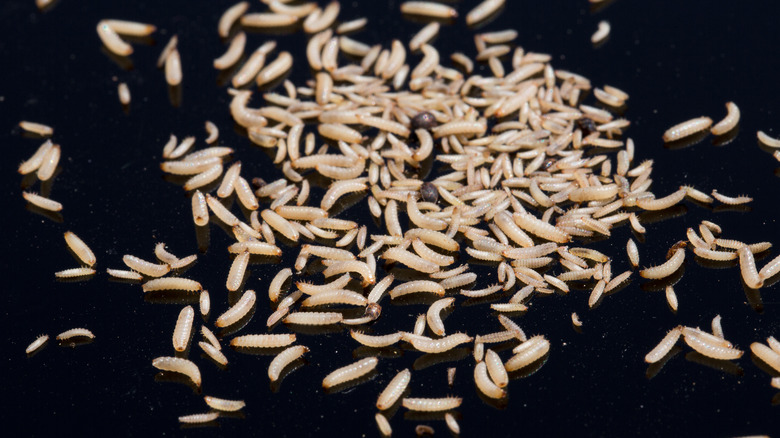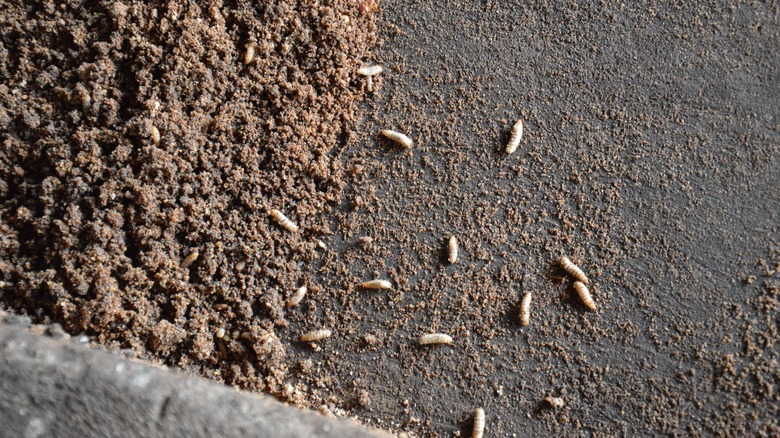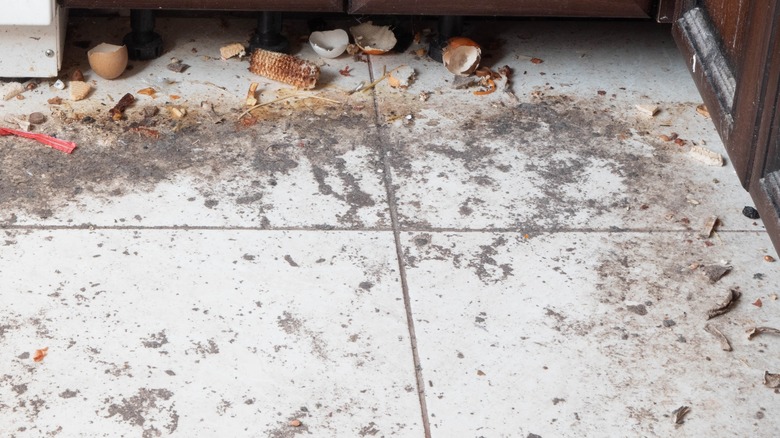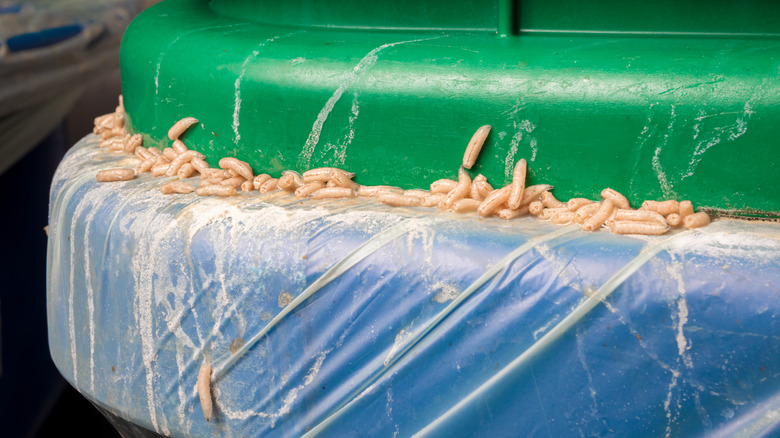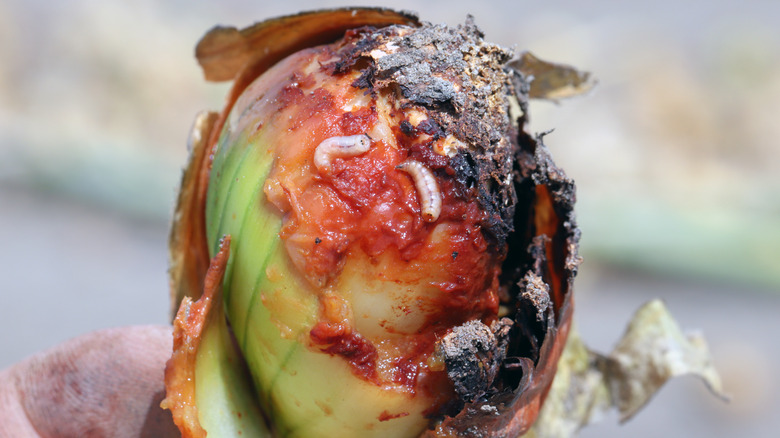Ways You're Unexpectedly Attracting Maggots To Your Home (& How To Eliminate Them)
We may receive a commission on purchases made from links.
Finding maggots in the house can be unnerving and creepy, as these soft, wiggly fly larvae are often associated with death and decay. However, rotting carcasses aren't the only draw for maggots. Like all decomposers, maggots like to feast on dead organic matter — and that includes old food residue, garbage, and dirt in general. Maggots' feeding behavior even serves an essential purpose in natural ecosystems, since breaking down organic material provides nutrients for primary producers, like plants.
However, while finding maggots in your yard is not necessarily bad news, you don't want or need these pests inside your residence. Fortunately, understanding what brings them inside the house and taking steps to eliminate the attraction can help you avoid future infestations. Now, you should know ahead of time that the typical reasons for these larvae's flagrant breach of your home's privacy are usually as disgusting as the maggots themselves, and most have to do with unsanitary conditions. With that in mind, let's cover the five top maggot magnets in order from beneficial, to ... well, downright revolting. We'll also learn how to get rid of maggots you find in the house. Hope you've had your dinner already.
Compost may attract maggots to your garden (but that's not a bad thing)
Compost may be great for your garden plants, but it's also an irresistible dinner invitation for soldier flies. These flies are drawn to rotting food, and if you use compost in your yard, you may notice them gathering around it — narrow, black bodies and wings are their most distinguishing features. But compost isn't just a food source for soldier flies. These insects also use it as a substrate for laying eggs. And when these eggs hatch, you'll notice that your yard has a new visitor — 1-inch-long, gray maggots that turn a brownish color as they age.
Of all the locations on your property, the garden is not a bad place for maggots to be. Apart from their gross appearance, they're harmless (as are soldier flies), and their behavior is beneficial to your plants. That's because maggots have a preference for items with a high nitrogen content, like the rotting food scraps in your compost pile. By consuming the compost, maggots help break down the organic compounds in it, which makes it easier for the ecosystem's smaller decomposers to break it down further. And when they pupate, their decaying skin enriches the surrounding soil with glucose and nitrogen. However, to make sure the maggots and soldier flies stay away from your house, avoid using compost in close proximity to the building. If you're not sold on the maggots' beneficial role in your garden's ecosystem, cover up the compost with material like dry grass or leaves.
Your home's floors don't get clean enough, and the dirt attracts flies
Maggots are fly larvae, and flies are attracted to filth. Most of all, they enjoy eating and breeding in rotting food scraps. If you find that the fly population in your house is surging, and are seeing maggots, there's a good chance that a source of dirt is attracting the insects. If you've checked all the places where you normally keep edible items and there's no evidence of decay, no uncovered food, and your trash cans are clean, consider the cleanliness of the floors. Even if you generally keep the house clean, it's easy to miss dirty spots on the floor, especially in tough-to-reach places like those around the oven or fridge. With time, food residue left on the floor can become a magnet for flies and their larvae. Not cleaning the floors thoroughly enough is a maintenance mistake that can attract maggots to your house.
If you suspect that dirty floors are the culprit behind the maggot problem in your home, start by killing the maggots, either with salt, boiling water, or water with vinegar. Then, vacuum and clean your home's floors meticulously, and pay close attention to areas where food spills can go unnoticed. To keep flies and maggots from coming back, make a habit of cleaning all the floors in the house often, and be sure to deep clean the kitchen properly.
Your trash can's odor invites flies to come and lay eggs
Trash cans make an ideal breeding ground for flies and their unsightly offspring, maggots. That's because garbage containers (particularly those with organic waste) provide both food and shelter for safe breeding. The odor they give off signals the availability of rotting food, which summons flies to flock inside and lay eggs. During the hotter months of the year, as food scraps decompose more rapidly and their stench becomes more prominent, fly and maggot infestations become particularly problematic. But luckily, you can oust the unwanted pests from trash cans — and keep them away — quite easily (even if the process triggers the gag reflex).
To begin exterminating maggots, you need the trash cans to be empty. So, you can wait until collection day, or, if the maggots' continued presence is becoming unpalatable, speed things up by taking the trash to a nearby disposal facility. Even though you're using garbage bags, some residue may remain on the inside of the bin — clean this up and toss it, too. Next, kill the maggots. You can do this by sprinkling them with salt, or by using a mixture comprising one part vinegar and three parts boiling water. Finally, clean the bin thoroughly with warm water and soap, before rinsing and dry it completely. Now that the bin is clean, do your best to keep it this way through regular maintenance. The less trash residue is left on its insides and the lid, the lower the chances of a new maggot infestation.
There's uncovered food somewhere in your home and flies have found it
If you have a busy household, it's easy to lose track of chores and allow chaos into your home. If this chaos takes a foothold in the kitchen, or other areas where you store food, you may inadvertently invite flies and their maggot babies into the home. Leaving food uncovered is the most egregious misstep, since open food is a powerful draw for flies, and a preferred egg-laying location. Once the flies lay their eggs on top of food, they'll hatch within just 24 hours — that's if you're lucky enough not to eat the food and the fly eggs with it first.
Dealing with a maggot infestation in your kitchen or other food storage areas entails a three-step approach. First, you need to find the food source that's drawing flies and maggots to a specific location. It can well be pet food that's drawing in the pests, so check places where you normally store it, too. Whether the food is rotten or not, get rid of it. It probably has fly eggs on it. Plus, you don't want to end up sharing the meal with maggots, right? After discarding the open food, kill the maggots using the aformentioned methods of water and vinegar, salt, or a commercially sold pesticide. Finally, sanitize the affected area. The second step is prevention. Change your habits and stop leaving food uncovered. Also, you can reduce the number of flies in your home by using appropriate traps — this step keeps maggots from emerging in the first place.
A dead animal in your crawl space makes an appetizing meal for maggots
You may not notice that a raccoon, cat, rat, or opossum has made a home inside your crawl space until the critter gives up the ghost and begins to decompose. If you observe maggots congregating in the lowest parts of your house just above the crawl space, there's a chance that a rotting carcass below is the culprit. The emergence of the rancid smell of death that seems to emanate from under the home is yet another clue that the maggots are in your home to feast on a meal. To expel maggots in this scenario, you need to remove the animal carcass, clean up any debris, and deodorize the space.
Begin by suiting up in some protective gear. A protective Tyvek suit (disposable ones are sold on Amazon), along with gloves, will shield you from any contaminants you may contact when handling the carcass. If you want to minimize the gross factor, you can also wear a respirator and goggles. That said, sadly, since the crawl space may be big and cluttered, you may have to use your olfactory senses to detect the animal. Once you've discovered the animal, place it in a garbage bag for later disposal in accordance with local regulations. Next, kill any maggots on sight, either with salt or an insecticide, and treat the entire area if the infestation has spread. Finally, deodorize the crawl space by placing cups of vinegar around the affected area for several days.
